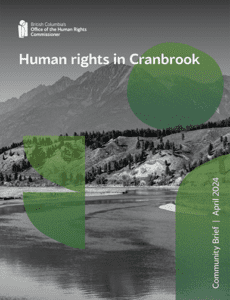Home »

Cranbrook captured in human rights report
 A recent report completed by British Columbia’s Office of the Human Rights Commissioner (BCOHRC) offers a snapshot of human rights challenges and community responses in Cranbrook.
A recent report completed by British Columbia’s Office of the Human Rights Commissioner (BCOHRC) offers a snapshot of human rights challenges and community responses in Cranbrook.
The Cranbrook brief is part of a four-part series that looks closely at human rights issues in four B.C. communities, including Cranbrook.
Three areas of concern are a focus of the Cranbrook brief: housing and poverty, health and discrimination and hate.
The brief describes “a significant shortage of subsidized housing in the community, making tenants vulnerable to exploitation by landlords and increasing the risk of homelessness.
“Meanwhile, the toxic drug emergency has had a major impact on the community, and there remain major barriers to accessing support, including discrimination against indigenous people, people experiencing homelessness and people with disabilities.”
BCOHRC Commissioner Kasari Govender stated: “To ensure our work is relevant and effective, we need to first look at the real impacts of human rights issues on the ground. We are committed to listening and responding to communities, ensuring that peoples’ experiences with human rights issues are at the centre of our work. To do this, we traveled to four diverse communities to gain a better understanding of what’s happening across the province.”
Along with Cranbrook, the BCOHRC looked at the District of Chetwynd and cities of Chilliwack and Terrace.
The Cranbrook brief isn’t all bad news, the BCOHRC noted, citing critical work being done by community organizations and others to help address human rights challenges.
“Many people in Cranbrook – and across B.C. – are coming together to build understanding, support one another and stand up to hate,” said Govender.
“Taken together, the briefs demonstrate something important: that members of very different communities across B.C. are working hard to address many of the same challenges. And we have lots to learn from one another.”
 Julie Rose, Cranbrook Food Bank executive director, said the food bank is grateful to have worked on the project with BCOHRC.
Julie Rose, Cranbrook Food Bank executive director, said the food bank is grateful to have worked on the project with BCOHRC.
“We are in the middle of a cost-of-living crisis that is violating peoples’ right to an adequate standard of living. Food and shelter are the two expenses no household can avoid, and they cost significantly more every year. We try so hard at our food bank to fill the gaps, but increased client numbers and decreased donations make it challenging.
“The community briefs highlight this issue and underscore a need to strengthen our social safety net to support our most vulnerable community members. And our clients’ resiliency, ingenuity, grit and kindness inspire us daily to continue our advocacy work in food security and find solutions.”
ANKORS’ Community Action Team coordinator Polly Sutherland said the BCOHRC briefs “could not have come at a better time to ensure the voices of rural citizens in Cranbrook impacted by human rights are captured. Our community is growing and we have faced many challenges in terms of the housing crisis, food security, poverty and stigma against people who use drugs. The current drug poisoning crisis adds another layer. These community briefs provide inclusion, compassion and respect, and a safe platform to have this important dialogue.
“As a result, we at ANKORS have formed a human rights community partner group, which will continue to bring our most vulnerable citizens’ voices forward as we navigate the ever-changing landscape of human rights in Cranbrook.”
e-KNOW







